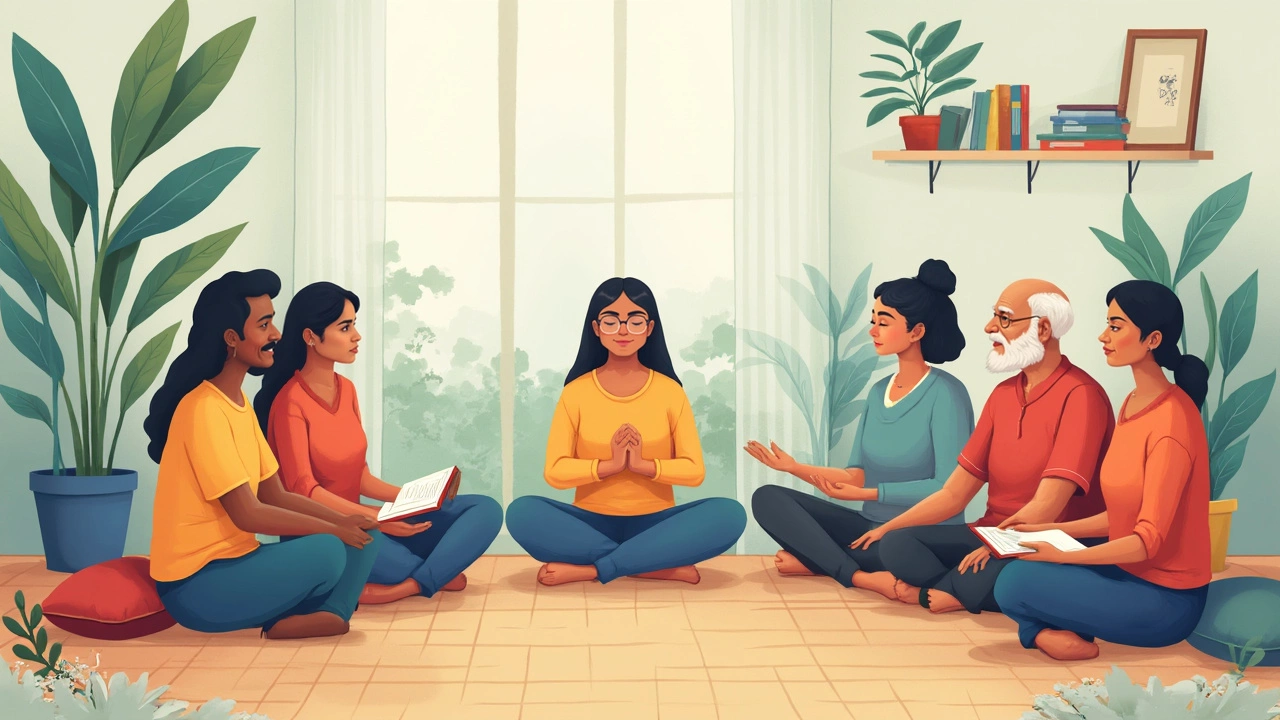Mental health can get overlooked until you hit a wall. A mental health therapist is basically the person you call when everything gets a bit too much. But what does that even mean? Are they just good listeners, or is there more to it?
Therapists are trained pros who help people deal with stuff like anxiety, stress, depression, messy relationships, and past trauma. They're not just there to nod and take notes—they use proven methods to actually help you handle life. Think of them like a personal trainer, but for your thoughts and feelings, not your abs.
People often wait way too long before reaching out. But here’s the inside scoop: most folks feel a weight off their shoulders after only a couple of sessions, even if things don’t change overnight. Just getting things out can be huge. Don’t wait for a crisis. If your head feels crowded, it might be time to get some backup.
- Mental Health Therapist: The Real Job
- How Therapy Actually Works
- Different Kinds of Therapy and Therapists
- Finding a Therapist That Fits You
- When (and Why) Therapy Helps
Mental Health Therapist: The Real Job
So, what does a mental health therapist actually do? It's more than just sitting in a cozy chair listening to people talk. A mental health therapist is trained to spot patterns in thoughts, behaviors, and emotions that mess with daily life. Their real job is helping people understand why they feel stuck and showing them practical ways out.
Most therapists spend their days meeting with clients, writing notes, and sometimes talking to other health professionals. They're guides—sometimes sounding board, sometimes coach. They use science-backed tools like cognitive-behavioral therapy (CBT) or dialectical behavior therapy (DBT) to help you handle anxiety, trauma, and more, not just talk it out.
Here's what you didn't know: therapists have to follow rules. They're usually licensed, meaning they had to do a lot of training, go through supervised practice, and pass a big test. Many therapists have Master's or Doctorate degrees. They can’t just give advice off the cuff—they use stuff proven to work. And they're held to high privacy standards, so your secrets stay safe.
- Therapist's daily workload: Most see about 10-15 clients each week.
- Popular therapy methods: CBT, DBT, psychodynamic therapy, couples therapy.
- Confidentiality: Legally bound to keep what you say private (with very few exceptions, like immediate danger).
Here's a quick look at who does what:
| Type | Years of Schooling | Prescription Privileges |
|---|---|---|
| Clinical psychologist | 6–10 | No |
| Psychiatrist | 8–12 | Yes |
| Counselor/Therapist | 5–7 | No |
Stats from 2024 show over 200,000 licensed therapists in the U.S. alone. That's a lot more than most people expect. If you ever wondered if therapy is some “fringe” thing, it's not. It’s common—and effective. Most surveys find that at least 75% of folks who try therapy say it helps.
How Therapy Actually Works
If you’ve ever pictured sitting on a couch just talking about your childhood, that’s an old stereotype. Modern therapy covers way more ground, and it’s not all about your past. A mental health therapist usually starts by getting to know what’s bothering you. Sure, you’ll talk, but it’s guided – not a random vent. Therapists listen and ask questions that get under the hood of your day-to-day problems, from stress at work to family fights, not just deep-seated issues.
Therapy sessions are usually 45 to 60 minutes and can happen once a week, twice a month, or whenever you need. You'll get homework sometimes—no, not like high school, but simple stuff: practicing a breathing technique, writing down thoughts, or trying a new way to talk to your partner.
Here’s what usually happens in a session:
- You share what’s bothering you. No script, just honest talk.
- Your therapist listens, then helps you sort things out—think of it like decluttering your brain.
- They might use methods proven by research—cognitive behavioral therapy (CBT) is super common and often focuses on changing negative thought patterns.
- Together you set goals, like sleeping better, handling anger, or surviving work drama.
If you’re worried about privacy, therapists are under strict rules to keep things confidential. There are rare exceptions, like if someone’s in danger, but for most stuff, your business stays between the two of you.
The science backs it up. A table from a 2023 U.S. study shows how most people start to feel better after regular sessions:
| Therapy Sessions Completed | % Reporting Noticeable Improvement |
|---|---|
| 1-2 | 25% |
| 3-6 | 48% |
| 7-12 | 63% |
| 13 or more | 75% |
Therapy isn’t magic but seeing progress in a few weeks is pretty common. So if you go in thinking nothing’s going to change, the numbers say otherwise. You don’t have to stick with the first therapist if it doesn’t click either—finding the right fit is part of the process.

Different Kinds of Therapy and Therapists
The world of therapy isn’t just one-size-fits-all. There are lots of ways to tackle mental health issues, and different types of therapists to help you out. Understanding your options can make a huge difference when you’re ready to try therapy or recommend it to someone else.
There are main “brands” of therapy you’ll see:
- Cognitive Behavioral Therapy (CBT): Super popular because it helps people spot and change unhelpful thought patterns. If you keep catching yourself in a cycle of worry or self-doubt, CBT is a proven way to break out and see things differently. In one study, around 60% of folks with moderate depression saw big improvement with CBT after 12 to 16 weeks.
- Dialectical Behavior Therapy (DBT): Originally made for borderline personality disorder, but now helps lots of people with mood swings or self-harm. It’s like CBT with more focus on coping skills and tolerance for stressful situations.
- Psychodynamic Therapy: This one digs into your past and the stuff you might not even realize is messing with you right now. It goes deep—so if you want to get to the root, this might be your jam.
- Humanistic Therapy: Focuses on helping you grow and figure out your true self, kind of like personal development with a therapist guiding you.
Therapists don’t all have the same training. Here are some types you might run into:
- Clinical Psychologists (PhD or PsyD): Can’t prescribe meds but are pros at talk therapy and mental health testing.
- Psychiatrists (MD or DO): These are the only ones on this list who can write prescriptions, handle medication, and do talk therapy.
- Licensed Clinical Social Workers (LCSW): Have a master’s degree and lots of experience helping people navigate life problems—super practical and down-to-earth.
- Licensed Professional Counselors (LPC) or Marriage and Family Therapists (LMFT): Masters-level folks who deal with things like anxiety, grief, and relationship issues.
Sometimes, what matters most is finding someone you feel comfortable talking to, no matter their title. That “fit” makes a bigger impact than which school they went to.
| Therapy Type | Main Focus | Used For |
|---|---|---|
| CBT | Changing thinking/behavior | Anxiety, depression, phobias |
| DBT | Coping skills, emotion regulation | Mood swings, self-harm, BPD |
| Psychodynamic | Exploring the past | Long-standing or deep-rooted issues |
| Humanistic | Personal growth | Life purpose, self-esteem |
A good mental health therapist will talk with you about what type makes the most sense for your situation. Don’t stress if you’re not sure where to start—lots of people try a couple of styles before settling on what feels right.
Finding a Therapist That Fits You
Picking a mental health therapist isn’t like picking a barber or pizza place. It’s way more personal, and getting it right matters a lot. The fit between you and your therapist sets the tone for every session, so don’t just go with the first name that pops up in your search.
Your first move: figure out what you want help with. Some therapists focus on stuff like anxiety or trauma, while others handle family or couples counseling. Mental health therapist is a broad job description. Check their bios for their specialty areas, background, and approach. If they mention things like "CBT" (cognitive behavioral therapy) or “person-centered,” those are treatment styles. Googling those terms before your first call can clue you in on what to expect.
Not every therapist clicks with every person, and that’s normal. If you don’t vibe after a session or two, it’s totally fine to shop around. Here are a few practical things to consider:
- Credentials: Look for "LPC," "LMFT," "LCSW," "PhD," or "PsyD" after their names. It means they’ve got solid training and a license. Ask if they have experience with what you need.
- Location: In-person or online? Both options are common now, and online therapy works better for some people, especially if you’re busy or don’t want to commute.
- Cost: Therapy can get pricey. Some therapists offer sliding scale fees, which means they charge based on your income. Always ask about insurance up front.
- Comfort: Your gut feeling matters. If you feel like you can’t be real with them, that’s a red flag.
A cool thing to know: In a 2023 survey, about 79% of people who met with more than one therapist before deciding said it helped them find a better match.
| Therapist Type | Typical Education | Common Focus Areas |
|---|---|---|
| LPC (Licensed Professional Counselor) | Master’s | Anxiety, depression, life changes |
| LMFT (Licensed Marriage and Family Therapist) | Master’s | Relationships, couples, families |
| LCSW (Licensed Clinical Social Worker) | Master’s | Trauma, family issues, social factors |
| PhD/PsyD (Psychologist) | Doctorate | Testing, advanced therapy, research |
Don’t be shy about asking questions. A good therapist expects it. You can even ask them straight up how they’d help in your situation, or what a first session looks like. If you like a direct, practical style, mention that. Prefer more talking or a hands-on approach? Let them know.

When (and Why) Therapy Helps
Some folks think therapy is only for people going through a big crisis. That’s a myth. Therapy is useful anytime life feels off—maybe you’re stressed at work, stuck in a rut, can’t sleep, or relationships feel like a mess. It doesn’t have to be rock-bottom before you reach out. Actually, the earlier you get help, the easier it is to talk stuff out before it gets out of control.
If you notice your moods are taking over your day, or you start snapping at people you care about, that’s a sign it might be time for a check-in. People also go to therapy if they keep thinking about old hurts, worry non-stop, or when nothing that used to feel good is working anymore. Here’s a solid list of reasons therapy helps:
- Tackling anxiety, depression, or stress that won’t let up
- Working through grief or big life changes (breakup, job loss, new parenthood, etc.)
- Managing bad habits, anger, or trouble focusing
- Fixing up communication problems, whether with a partner, family, or friends
- Figuring yourself out, like why certain patterns keep repeating
Sometimes, therapy is part of treating mental health conditions, like depression or PTSD, and sometimes it’s just about maintenance—like keeping your mind healthy the way you’d go for a yearly checkup at the doctor’s office.
Here’s a quick look at how people actually benefit:
| Benefit | Fact/Stat |
|---|---|
| Reduced symptoms | About 75% of people who try therapy see some improvement, according to the American Psychological Association. |
| Better relationships | Most people report smoother family or partner communication after just a few sessions. |
| Lasting results | Studies show the effects of therapy often last longer than medication alone for things like depression and anxiety. |
Don’t wait for things to get critical. Even small stuff—like getting stuck in worry loops, overthinking, or feeling unmotivated—are totally valid reasons to talk to a mental health therapist. Think of it as investing in yourself, not just putting out fires.





